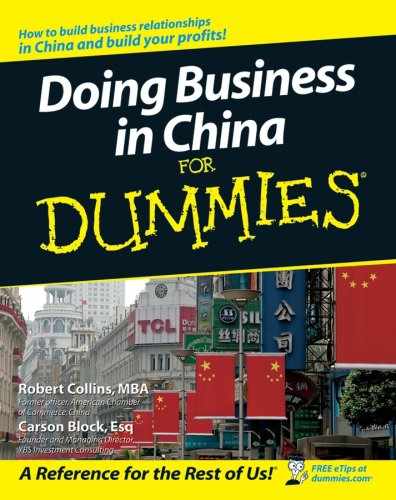Classifying Your Company and Reckoning with Restrictions
Although China is robust with business opportunities, you have to maneuver through more than a few restrictions. China has reasons for such limits:
| ✓ | China is still transitioning from a command-type economy, and it still likes to have a lot of control. This idea is particularly true as China tries to balance economic development with social stability. |
| ✓ | China is trying to gradually expose its companies to foreign competition. The government hopes bringing in foreign competition more slowly will allow Chinese companies to strengthen and be able to compete. |
| ✓ | China considers certain industries to be essential for national security, so it restricts foreign investment. |
At the same time, China is actively looking for foreign investors in a number of industries, especially export-oriented ones. China also encourages foreign investment in certain industries because it wants to discover how to do those businesses or use a particular technology.
This section discusses industry regulations that have to do with your scope of business. To find out how the Chinese feel about foreign investment in your industry, consult the foreign investment catalog discussed in the next section.
Checking out the catalog
Any serious consideration of doing business in China should begin with the Catalogue for the Guidance of Foreign Investment Industries (the foreign investment catalog). Type the name of the catalog in your search engine or visit www.fdi.gov.cn/pub/FDI_EN/Laws/law_en_info.jsp?docid=51089 for an unofficial English version of the catalog.
The catalog breaks down industries into three categories:
| ✓ | Encouraged: You want to be in the encouraged category if possible. Encouraged companies may receive tax preferences and incentives. The incentives vary by industry and location, so you have to analyze possible benefits thoroughly. Most encouraged industries allow WFOEs (see “Choosing a wholly foreign-owned enterprise,” earlier in this chapter). |
| ✓ | Restricted: When an industry is restricted, foreigners usually may not own more than a certain percentage of a company in that industry. The percentages vary, but a 49 percent cap is common. |
| ✓ | Prohibited: As the name suggests, prohibited industries are closed to foreign investment, regardless of how little registered capital foreign investors own. |
When an industry isn’t listed in the catalog (which is the case with most industries), it’s generally considered to be permitted — neither encouraged nor discouraged.
For your application for business approval, you have to submit your Articles of Association (AOA). The AOA contains your scope of business (see the upcoming “Getting MOFCOM and the AIC to approve your scope of business” section).
Sometimes, you need a thorough study of the catalog (fortunately it’s not that long) to finesse your company’s business into a more favorable category. If you’re going for encouraged status, the scope of business needs to match or include items from the encouraged part of the catalog. If you’re trying to avoid restricted or prohibited, your scope of business should avoid sounding too much like the items under the restricted/prohibited sections of the catalog. The scope of business is not a mere formality though — your company’s actual business must be within the scope of business!
Identifying highly regulated industries
The foreign investment catalog (see the preceding section) can be a little confusing because similar-sounding activities in the same industry can be classified in two wholly different categories (usually as restricted and prohibited). But this ambiguity can also be your opportunity to get a more favorable classification — possibly by making some hopefully small adjustments to your business model.
Although a number of businesses are restricted or prohibited for one policy or another, you should know that some industries bring a lot of restrictions:
| ✓ | Media: As a one-party state, China doesn’t trust foreigners to disseminate much information. Operating in media (which can include Internet businesses) can be frustrating because your company is expected to know what topics are off-limits with little guidance. These limits have been particularly hard for companies such as Google and Yahoo!, which have had issues with bloggers posting information that the government considers sensitive. |
| ✓ | Real estate: Real estate development is often a highly regulated area, too. In a socialist country, land ownership and use — especially by foreigners — is a touchy subject (see the later section titled “Landing your land”). |
| ✓ | Finance: Another difficult (but not impossible) industry is finance. This category includes insurance, investments, and banking. Finance is a key sector in any economy, and China wants to allow its financial institutions room to develop so they can compete with foreign companies. |
